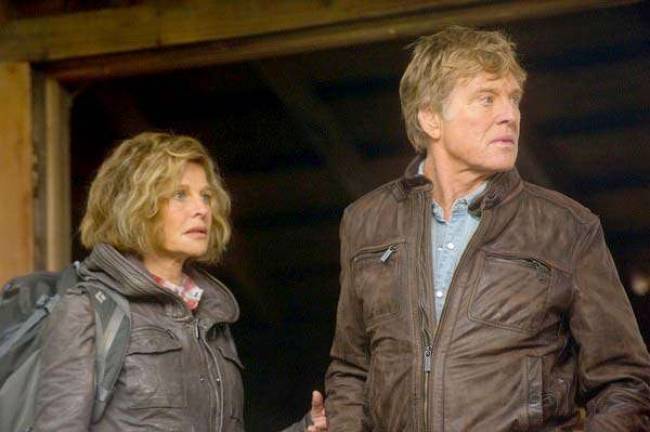Granola Politics Turned Cornball

Redford film misremembers 60s radicals
Ten years ago, a documentary titled The Weather Underground opened at Film Forum and inadvertently exposed the follies of romanticizing the radical student movement of the 1960s. Now Robert Redford presents his own romantic version in The Company You Keep. It's an old-timer's look at the movement's faults when an attempted Robin Hood-style bank robbery resulted in a bank guard's death and the gang of radicals disappeared into the underground taking on new identities to hide out from the Man, er uh, the law, I mean, justice.
Redford plays James Grant, a former radical who did not participate in the robbery-killing yet has been on the run ever since, wary of contact with his once-engaged peers--Susan Sarandon, Stephen Root, Nick Nolte, Richard Jenkins, Sam Elliott. This old-timer's convocation shows that Redford expects 21st century viewers (possibly Occupy Wall Street zealots) to approve his tale of reminiscence and remorse. It might have worked if Occupiers cared about has-been actors or if Redford and screenwriter Lem Dobbs had come up with a compelling storyline.
But since Grant is innocent, unlike those radicals in The Weather Underground doc who still justify their lawless, what's the point? Redford's film proposes a comity of radicals similar to his previous dismal anti-government/pro-radicals film The Conspirator. There's no real moral struggle in The Company You Keep. Instead, the only tension is generational and professional: Redford once again takes shots at journalists, the trade he formerly valorized in Three Days of the Condor and All the President's Men but recently upbraids as in the underrated Lions for Lambs and here.
Shia LaBeouf plays an aggressive reporter chasing Grant on the lam, aiding FBI agent Terence Howard III's manhunt. With his ego-hip eyeglasses and obnoxious manner, LaBeouf stands-in for the current, selfish young generation, the audience for Grant's sermons. Alternating their stories prolongs the film and covers up Redford and Dobbs's ethical and historical evasions.
Redford's damnedest equivocation sentimentalizes 60s radicalism through Grant's past romance with Mimi (Julie Christie), an unrepentant extremist who even now illegally smuggles "good honest weed." It's unpleasant to report that Redford and Christie, who are no longer their youthful selves, let their own vanity substitute for the thin characterizations; that means the attempt to make 60s politics appear glamorous depends on Redford and Christie's faded glory. Sadly, the film emphasizes the stars' wrinkles, wattles, pockmarks (and physical exhaustion whenever Redford runs). That Redford's granola politics turn cornball is terrible but the exploitation of wizened countenances is hurtful. My guess is that this would not be a problem opposite Jane Fonda or Vanessa Redgrave who have kept their vigor but they probably wouldn't consent to the film's simple-minded view of radicalism--or maybe Christie is just frightfully directed.
It is Redford whose mediocre Ordinary People began the actor-turned-director vogue that has led to the non-politics and non-aesthetics of Ben Affleck's Argo. The banal politics of The Company You Keep compares poorly to David Mamet's recent Broadway examination of student radical motivations in The Anarchist. Redford nostalgically equates My Lai and Selma, Ala. even though they have no historical or political similarity. His fatuousness is summed up by a Bill Ayers-type former radical now privilege-ensconced college professor who introduces Frantz Fanon to his students yet mispronounces the name.
Follow Armond White on Twitter at 3xchair